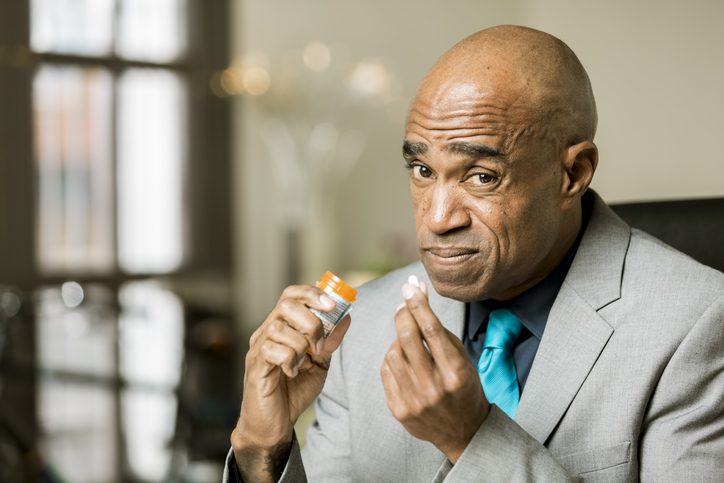OxyContin is a type of opioid that is often prescribed to treat significant or chronic pain. Because of its addictive qualities, OxyContin is often misused. If you have an OxyContin addiction, it’s critical to receive treatment for it. That treatment may include detox, residential, and/or outpatient care.
What Is OxyContin?
OxyContin is the brand name for oxycodone, sometimes referred to as just Oxy. It is a prescription medication that is sometimes sold illegally and used outside of the prescription written by a doctor. Because of how addictive it is, OxyContin is a dangerous drug, even for those who take it as prescribed. Always follow your doctor’s recommendations for use and stop using it (with doctor approval) as soon as possible.
OxyContin works to reduce pain signals traveling from the body to the brain, alleviating any pain you feel. It can cause a wide range of side effects, including a euphoric feeling that occurs because the drug triggers the pleasure center of the brain. Side effects may also include:
- Calmness
- Overconfidence
- Pleasure, happiness
- Reduced anxiety or worry
- Dizziness
OxyContin is perhaps one of the most commonly abused types of prescription opioids. It can work for as long as 12 hours, providing individuals with pain relief for most of the day. That’s due to its controlled-release design.
OxyContin comes in pill form, but those using it outside of a prescription often smash the pill, mix it with water, and inject it. This increases the concentration of the drug in the bloodstream, which is both very dangerous and highly addictive.
How Does OxyContin Addiction Develop?
Many of those who develop an OxyContin addiction do so after taking their medication as prescribed by their doctor. Over time, the body becomes used to the amount being taken, creating a tolerance to it. That means the person needs a higher dose to feel the same high or to maintain their pain relief. The more of the drug consumed, the higher the risk of damage to the body, including overdose.
OxyContin is one of the drugs that have led to the opioid epidemic in the U.S. In 2018, nearly 15,000 people overdosed from prescription opioids like OxyContin, which is about 41 people each day of the year, as noted by the Centers for Disease Control and Prevention.
Dependence is another factor in OxyContin addiction. A person’s brain and body become dependent on the drug to function. That’s why you feel cravings for the drug when the effects are wearing off. Withdrawal can create intense pain and discomfort.
How Do You Know You Have an OxyContin Addiction?
Perhaps the most difficult part of using this type of opioid is that you may need it to control your pain. How do you know, then, that you’ve developed a dangerous addiction? Some of the most common signs of addiction include:
- Needing more of the drug than your prescription allows
- Feeling withdrawal symptoms (pain, cravings, agitation) when you do not have access to the drug
- Using the drug outside of your prescription (using it without a prescription)
- Doctor-shopping (going to multiple doctors to get more than one prescription)
- Putting your use of OxyContin ahead of everything else, including relationships and responsibilities
- Engaging in risky behavior while using the drug
If you find yourself using this drug outside of your recommended dose or using someone else’s prescription, that’s a clear sign it is time to seek out help for your condition. Treatment for OxyContin addiction can be effective for many people.
It can be difficult to tell when you’re on the verge of addiction. But when you take increasingly larger doses of the drug, you put yourself at risk for overdose. You may also feel like you are chasing a high, always waiting for and thinking about the next dose. Addiction limits your overall quality of life, damages relationships, and can be financially devastating as well.
What Happens in OxyContin Addiction Treatment?
In some situations, addiction treatment for opioids requires medically supervised detox. Detox is a process in which the body works to dispel the drugs while also breaking your dependence on them. Your body and brain learn to work properly again without the drugs. Because detox can lead to severe withdrawal symptoms, medical supervision is highly recommended. Doctors can monitor your vital signs and administer medications to help ease your discomfort.
Not everyone needs detox. If your addiction is mild, you may be able to benefit from outpatient therapy involving regular meetings with a therapist and with others in recovery so that you can understand your addiction and gain resources and skills to prevent relapse.
OxyContin addiction treatment may also utilize alternative types of pain relief, aiding in reducing the pain and discomfort you may feel from your previous injury or chronic condition.
If you feel that you have an addiction to OxyContin or any other drug, reach out to our team at Great Oaks Recovery Center. We can help you decide what to do next. Don’t allow painkiller addiction to limit your health or your future.



